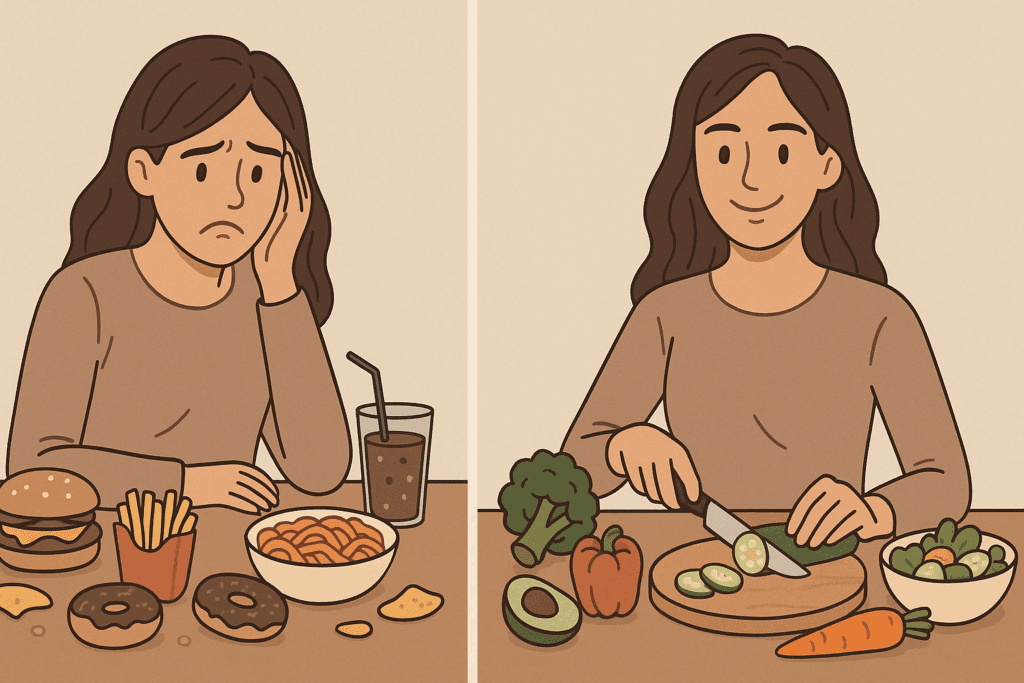Understanding the Connection Between Eating Disorders and Lifestyle Health
The intricate relationship between eating behaviors and overall lifestyle health is far more nuanced than it may appear at first glance. Eating disorders are not merely about food; they are complex mental health conditions that often intertwine with emotional well-being, self-perception, and physiological health. Recognizing this multifaceted connection is the first step toward addressing disordered eating patterns in a meaningful and lasting way. For many individuals, the pathway to recovery and better health involves more than simple dietary changes—it requires a deeper psychological and emotional transformation supported by professional care.
You may also like: How to Stop Emotional Eating and Regain Control: Mindful Nutrition Strategies That Support a Healthier Lifestyle
When discussing lifestyle improvements, it’s crucial to note that nutrition alone doesn’t ensure well-being if it’s influenced by obsessive control, restriction, or fear. This is where an eating disorder specialist plays a vital role. These professionals are trained to identify and treat not just the visible symptoms but also the psychological roots of disordered eating behaviors. Through personalized care, they help individuals establish a healthier relationship with food, their bodies, and themselves. Over time, such holistic support enables people to integrate mindful nutrition into their lives in a way that promotes sustainable wellness.

The Role of an Eating Disorder Specialist in Comprehensive Wellness
An eating disorder specialist is not simply a therapist with a general understanding of nutrition or psychology. Rather, this professional is uniquely trained in the diagnosis and treatment of a wide spectrum of eating-related conditions. Whether someone is struggling with anorexia, bulimia, binge eating, or an unspecified eating disturbance, the guidance of a specialist ensures that treatment is evidence-based and tailored to the individual’s specific psychological and physiological needs. Their expertise extends beyond basic counseling to include a thorough grasp of medical monitoring, behavioral interventions, and nutritional rehabilitation.
Working with an eating disorder specialist often involves a team-based approach, where the specialist coordinates care with dietitians, physicians, and sometimes psychiatrists. This multidisciplinary collaboration ensures that all aspects of the disorder—from nutritional deficits and physical complications to underlying trauma or anxiety—are addressed cohesively. By aligning therapeutic strategies with medical insights and nutritional planning, these specialists lay the foundation for recovery that is both comprehensive and lasting.
Importantly, eating disorder specialists promote a culture of empathy and nonjudgment. Many people facing eating disorders are burdened by shame or fear of being misunderstood, which can deter them from seeking help. The therapeutic environment created by specialists encourages openness and trust, allowing individuals to confront their behaviors without fear of stigma. This compassionate framework is essential for healing and for building the confidence necessary to embrace mindful eating habits that enhance lifestyle quality.

How Eating Disorder Therapy Facilitates Nutritional Awareness and Balance
Eating disorder therapy is a critical component of the recovery process and directly contributes to the cultivation of mindful eating practices. Unlike traditional talk therapy, eating disorder therapy often incorporates specific therapeutic modalities such as cognitive-behavioral therapy (CBT), dialectical behavior therapy (DBT), and family-based therapy (FBT), all of which are tailored to disrupt the destructive thought patterns that fuel disordered eating. These therapies aim to replace harmful beliefs about food and body image with healthier, more realistic perspectives.
Within the therapeutic process, individuals learn to recognize the emotional triggers that influence their eating behaviors. This increased awareness allows them to respond with mindfulness rather than compulsion or avoidance. For example, someone who previously used binge eating to cope with anxiety might, through therapy, develop skills such as distress tolerance and emotional regulation. These tools not only address the disordered behavior but also empower individuals to make food choices that reflect their body’s actual needs.
In many cases, eating disorder therapy also involves structured meal planning and nutritional education. By demystifying food and debunking dietary myths, therapists help individuals rediscover food as a source of nourishment and joy rather than anxiety and control. This is where the principles of mindful eating become particularly transformative. Through therapy, individuals gradually learn to listen to their hunger cues, savor their meals, and honor their body’s unique requirements—all of which support a balanced and health-conscious lifestyle.

Why Early Intervention and Access to Eating Disorder Doctors Near Me Matters
Timely access to care can be a decisive factor in the recovery process. Many individuals delay seeking help due to stigma, unawareness of their condition, or uncertainty about where to turn. This is why searching for “eating disorder doctors near me” can be a pivotal moment in someone’s wellness journey. Local access to specialized care not only reduces logistical barriers but also fosters consistency in treatment, which is crucial for recovery.
When people begin to notice patterns of restrictive eating, compulsive exercise, or emotional bingeing, connecting with a nearby professional allows for quicker diagnosis and intervention. Early-stage treatment is often less intensive and more responsive, which can prevent the disorder from becoming deeply ingrained or leading to severe medical complications. Moreover, the sooner a person can begin treatment, the sooner they can start learning mindful nutrition strategies that support long-term health.
Eating disorder doctors near me are more than just convenient—they are lifelines within the community. These practitioners often have established relationships with local therapists, dietitians, and support groups, which enhances the coordination of care. Their understanding of regional resources can also help patients and families navigate treatment options with greater ease. Importantly, proximity to care may encourage ongoing follow-up, which is essential for monitoring progress and preventing relapse.

Integrating Mindful Eating Into the Recovery Journey
Mindful eating is not a trend or quick fix—it is a practice rooted in self-awareness, presence, and compassion. For individuals recovering from eating disorders, adopting a mindful approach to food can feel both unfamiliar and liberating. It requires them to slow down, notice physical hunger and fullness cues, and pay attention to the emotional context of their meals. While this may sound simple, for someone who has long struggled with disordered patterns, it is a radical shift that often requires therapeutic support and practice over time.
The process of integrating mindful eating involves undoing years of habitual thought patterns and replacing them with intentional, present-focused behavior. It teaches individuals to become curious rather than judgmental about their food choices. For example, instead of labeling foods as “good” or “bad,” mindful eating encourages people to consider how different foods make them feel, both physically and emotionally. This perspective allows for a more flexible and less restrictive relationship with food, one that is aligned with overall wellness rather than rigid dietary rules.
Therapists often guide clients in using mindfulness techniques during meals, such as deep breathing, body scans, or gratitude practices. These techniques not only enhance the sensory experience of eating but also foster a sense of calm and connection to the present moment. Over time, such practices can reduce the anxiety and guilt that often accompany eating for those with disordered habits. The result is a more intuitive, peaceful, and self-respecting approach to nourishment that supports sustainable health and well-being.

The Long-Term Impact of Working With an Eating Disorder Specialist
One of the most valuable aspects of working with an eating disorder specialist is the long-term impact on a person’s relationship with food, body, and self. Recovery is rarely a linear path, and having consistent support makes a profound difference in sustaining progress. Specialists provide not only clinical expertise but also emotional validation and practical tools that continue to serve individuals long after therapy ends. This continuity is essential for building resilience and maintaining lifestyle improvements.
Over time, individuals often report increased confidence in making food choices, decreased anxiety around meals, and a stronger connection to their body’s needs. These are not just signs of recovery—they are indicators of a transformed lifestyle rooted in mindful nutrition and self-compassion. Many people also find that as their eating behaviors stabilize, other areas of life begin to flourish, including their social relationships, career pursuits, and overall emotional regulation.
Additionally, specialists are equipped to support individuals through life transitions that might challenge their recovery. Whether it’s starting college, entering a new relationship, or facing health-related changes, having access to ongoing care ensures that setbacks are addressed early and constructively. This proactive approach reinforces the idea that health is not a destination but a dynamic and evolving process—one that is enriched by the ongoing presence of compassionate, knowledgeable care providers.

Bridging the Gap Between Clinical Care and Daily Life Through Eating Disorder Therapy
While medical intervention is vital, recovery truly takes root when therapeutic insights are applied to everyday life. This is where eating disorder therapy plays an irreplaceable role. Therapists help clients translate clinical knowledge into practical habits, whether that’s planning meals, setting boundaries with diet culture influences, or managing stress without turning to food. These skills anchor recovery in the real world, where triggers are inevitable but manageable with the right tools.
Many individuals come to therapy with the belief that they must either control their eating perfectly or abandon their health altogether. Eating disorder therapy dispels this false dichotomy and instead promotes a model of flexibility and self-trust. Clients learn that they can pursue nutrition and wellness without succumbing to the rigid thinking that often accompanies eating disorders. This balanced mindset not only supports physical health but also empowers individuals to lead fuller, more meaningful lives.
Importantly, therapy provides a space for continuous reflection and adjustment. As individuals encounter new challenges or milestones, they are encouraged to revisit and refine their coping strategies. This iterative process mirrors the evolving nature of life itself and helps ensure that recovery remains relevant and sustainable. Through regular engagement with therapeutic practices, individuals cultivate a robust inner foundation that supports mindful living in all its dimensions.
Frequently Asked Questions: Eating Disorder Recovery, Therapy, and Specialized Support
What makes eating disorder therapy different from general mental health counseling?
While general mental health counseling may address anxiety, depression, or stress, eating disorder therapy takes a highly specialized approach to disordered eating behaviors and their psychological underpinnings. Eating disorder therapy incorporates techniques such as cognitive restructuring, meal-related exposure, and nutritional psychoeducation that are specifically designed to target the complex interplay between food, emotions, and self-image. Therapists often work in conjunction with an eating disorder specialist to ensure that medical and psychological needs are fully addressed. What truly sets this therapy apart is its integration of food-related rituals, distorted body image, and physiological recovery into each treatment plan. It also commonly involves close monitoring of medical symptoms, which is not always the case in general therapy settings.
How can I find eating disorder doctors near me who understand both medical and psychological aspects of treatment?
Many individuals searching for eating disorder doctors near me may not realize that dual-competency in medical and psychological care is a key criterion in effective treatment. A well-qualified eating disorder physician typically has experience not only with the physical complications of disordered eating—such as electrolyte imbalance, malnutrition, or cardiac irregularities—but also with the emotional and behavioral patterns that sustain the condition. It’s often helpful to consult with a hospital’s behavioral health department, university health centers, or eating disorder treatment programs to locate such professionals. You may also look for doctors affiliated with the Academy for Eating Disorders or other national organizations that certify expertise in this field. Locating eating disorder doctors near me with this kind of integrated training can streamline referrals and support a more cohesive recovery process.
Can an eating disorder specialist help with less severe or atypical eating behaviors?
Yes, an eating disorder specialist can be extremely helpful even for individuals who don’t meet the clinical criteria for anorexia or bulimia. Disordered eating occurs on a spectrum, and behaviors like emotional eating, orthorexia (obsession with healthy eating), or chronic dieting may still warrant professional attention. Working with a specialist allows you to unpack the underlying cognitive and emotional patterns fueling those behaviors before they develop into more severe conditions. In many cases, early intervention with an eating disorder specialist can prevent the need for more intensive treatment later. These professionals are trained to recognize subtler signs of distress and can offer tailored strategies for restoring balance before behaviors become entrenched.
What role do support systems play in the success of eating disorder therapy?
Support systems—including family, friends, or even peer recovery communities—can significantly influence the outcome of eating disorder therapy. While therapy provides professional guidance, a strong support network reinforces behavioral change outside the clinical setting. In family-based therapy models, for example, loved ones are directly involved in meal support and relapse prevention strategies, creating a united front against the disorder. Therapists often help clients navigate difficult social situations where food and body image become triggers, and this is where community support proves invaluable. Whether you’re working with an eating disorder specialist or exploring eating disorder doctors near me, consider how your social environment can be leveraged for healing.
Are there emerging trends in eating disorder therapy that go beyond traditional talk therapy?
Absolutely. One of the most promising developments in eating disorder therapy involves integrating somatic therapies, such as trauma-informed yoga or sensorimotor psychotherapy, into treatment plans. These methods help clients reconnect with their bodies in a safe, nonjudgmental way—an important aspect given how many people with eating disorders experience dissociation or body dysmorphia. Biofeedback tools, virtual reality exposure therapy, and neurofeedback are also being explored as adjunct therapies to traditional approaches. Some eating disorder specialists are incorporating digital platforms that use AI-driven tracking to monitor behavioral progress and mood patterns in real time. These innovations reflect a growing understanding that recovery is not just mental—it is also deeply embodied and neurological.
How do eating disorder doctors near me typically collaborate with other professionals during treatment?
Integrated care is a cornerstone of successful recovery, and most eating disorder doctors near me are accustomed to working as part of a multidisciplinary team. These collaborations often include dietitians, psychotherapists, and sometimes psychiatrists or endocrinologists, depending on the medical complexities involved. Weekly or bi-weekly case reviews ensure all team members are aligned on treatment goals and symptom monitoring. Effective collaboration also includes coordinating lab tests, sharing nutritional guidelines, and making adjustments to medication or meal planning as needed. This collective approach allows the care team to treat not just the symptoms, but the person as a whole—emotionally, physically, and psychologically.
What are some signs that it’s time to seek help from an eating disorder specialist?
Certain red flags suggest it may be time to consult an eating disorder specialist. These include an overwhelming preoccupation with food or body weight, erratic eating patterns, secrecy around meals, or a sudden change in physical health without a clear cause. Emotional signs, such as guilt after eating, social withdrawal, or excessive exercise, can also indicate the need for professional evaluation. Many people wait until symptoms worsen before searching for help, but early signs should never be ignored. Even if you’re unsure whether your behaviors are “serious enough,” a consultation with an eating disorder specialist can provide clarity and direction. Their goal is not to label you but to support a healthier, more sustainable relationship with food and your body.
How can I prepare for my first session with an eating disorder specialist?
Preparation for your first session with an eating disorder specialist involves both emotional and practical readiness. Emotionally, it’s important to approach the meeting with openness—even if you’re feeling anxious or skeptical. Practically, you may be asked to complete intake forms detailing your eating habits, mental health history, and current concerns. Bringing a food journal or documenting recent eating episodes can also provide valuable insights. The specialist will likely explore your goals, current routines, and challenges in depth to design a plan tailored specifically for you. Remember, the first session is not about judgment—it’s about starting a conversation that could transform your relationship with food and health.
Is it possible to work with eating disorder doctors near me through telehealth services?
Yes, telehealth has made eating disorder treatment more accessible than ever. Many eating disorder doctors near me now offer virtual appointments, which can be particularly beneficial for individuals in rural areas or those with transportation or time constraints. While some aspects of care—such as physical assessments or lab work—may still require in-person visits, much of the therapeutic and nutritional counseling can be done remotely. In fact, many patients find virtual sessions to be more flexible and less intimidating, which can enhance treatment engagement. Telehealth also allows for more frequent check-ins, which can be crucial during periods of crisis or relapse risk.
What should I expect in long-term eating disorder therapy?
Long-term eating disorder therapy focuses on evolving goals, deeper emotional work, and relapse prevention strategies. As therapy progresses, sessions may shift from symptom management to exploring identity, purpose, and emotional regulation beyond food. You’ll likely work on repairing self-image, setting healthy boundaries, and building resilience to societal pressures. Therapists may also help navigate new life stages—college transitions, pregnancy, aging—that can trigger old patterns. Whether you’re still seeing an eating disorder specialist or maintaining follow-ups with eating disorder doctors near me, long-term therapy provides continuity and adaptability, helping ensure that recovery is not just achieved but sustained.
Conclusion: Reclaiming Health Through Mindful Nutrition and Specialized Care
The journey to a healthier lifestyle does not begin and end with food—it starts with self-awareness, healing, and the courage to seek help. Working with an eating disorder specialist or engaging in eating disorder therapy offers more than symptom relief; it provides a roadmap for holistic wellness. These professionals guide individuals through the complexities of recovery, empowering them to reconnect with their bodies and redefine their relationship with nutrition. In doing so, they illuminate a path toward mindful eating that is grounded in compassion and sustainability.
The availability of eating disorder doctors near me ensures that specialized support is accessible and integrated into the fabric of everyday life. This proximity fosters not just convenience but continuity, which is essential for long-term success. As therapy becomes a regular part of one’s routine, it bridges the gap between clinical knowledge and lived experience, anchoring recovery in daily practice. With each mindful choice, each compassionate meal, and each therapeutic insight, individuals move closer to a lifestyle that honors both their physical and emotional well-being.
In reclaiming their health through mindful nutrition and specialized care, individuals not only heal from disordered eating—they rediscover joy, vitality, and purpose. This transformation, guided by expert support and nurtured through daily intention, stands as a testament to the power of integrated, human-centered care in creating lasting wellness.
Was this article helpful? Don’t let it stop with you. Share it right now with someone who needs to see it—whether it’s a friend, a colleague, or your whole network. And if staying ahead on this topic matters to you, subscribe to this publication for the most up-to-date information. You’ll get the latest insights delivered straight to you—no searching, no missing out.

